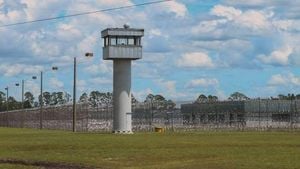The Moldovan gas supply has resumed to the breakaway region of Transnistria, marking a significant move to prevent potential humanitarian crises as tensions continue to rise following interruptions of Russian gas deliveries. Beginning on February 1, 2025, Moldovagaz commenced deliveries of natural gas to Transnistria based on a loan agreement to provide 3 million cubic meters of gas, elevated to prevent pressure drops within the local infrastructure.
This initiative, initiated early on the morning of February 1, was confirmed by Vadim Ceban, the acting director of Moldovagaz, who stated, "The volumes pumped are enough to maintain pressure." This supply is not derived from new purchases on the market but rather utilizes gas already within the pipelines running from Moldova's right bank, where reserves were accumulated prior to Russian gas cessation.
The urgency of this situation cannot be overstated. Following the halting of Russian gas supplies to Moldova, which stopped on January 1, 2025, the region of Transnistria faced dwindling gas reserves, heightening fears of infrastructure failures and crises among the population. Without rapid intervention, these anxieties could culminate in severe humanitarian challenges.
Ceban explained the arrangement, asserting, "This gas will be supplied for technical purposes and is not humanitarian aid." This statement from Krasnoselski, the de facto leader of Transnistria, speaks to the sensitive nature of the assistance provided and hints at broader political currents impacting energy negotiations.
Yesterday, the Moldovan government made additional moves to bolster the energy security of both its territories. Energocom, the state-owned energy company, has also begun purchasing gas for the region through European exchanges, as directed by the Commission for Exceptional Situations. Under this directive, the company is tasked with acquiring up to 3 million cubic meters of gas daily to bolster the steady weakening supply predicament created by geopolitical strife.
During this period, the Transnistrian government had enlisted Tiraspoltransgaz to assume responsibility for the transit of the borrowed gas and expressed intentions to compensate Moldova for the supplies received, with payments due by March 1, 2025.
With Moldova seeking to navigate this complex energy crisis, Prime Minister Dorin Recean has been clear about the conditions attached to these transactions, stating, "The government does not negotiate with anyone and does not mediate any transaction." This emphasis on legal clarity underlines Moldova's intent to operate within international norms, particularly amid increased scrutiny over energy contracts.
Critically, Recean mentioned the necessity for transparency, relaying, "We will analyze which companies are involved and make sure they comply with the law." Such vigilance is integral to sustaining proper governance and maintaining energy welfare without compromising national interests.
This coordinated action signals Moldova's operative stance amid the geopolitical pressures surrounding it, characterized by heightened awareness of energy independence following years of reliance on Russian resources. With the political ramifications of gas supply routes so heavily tied to regional stability, the current actions also reflect strategic thinking directed toward ensuring long-term energy autonomy.
Looking forward, the engagement of European markets as sources for energy supply opens new avenues for Moldova, characterized by increased security against previous dependencies. The assertive steps taken today resonate with Moldova's strategic objectives and political aspirations, even as they navigate the uncertain waters of regional relations.
Even at this juncture, the actions taken reflect both immediate needs and larger ambitions of the state, intertwining them with the realities of energy dependence and geopolitical affiliations. Setting the foundation now by maintaining all operational standards can lead to transformative changes for Moldova's energy future.
This development is pivotal, not just for the people of Transnistria but for the broader fiber of Moldova's energy strategy. Transparency, compliance with law, and strategic independence seem poised to guide the course of Moldova's energy policies for years to come.



